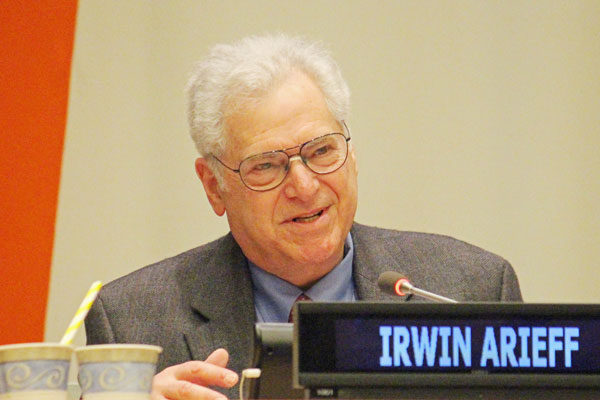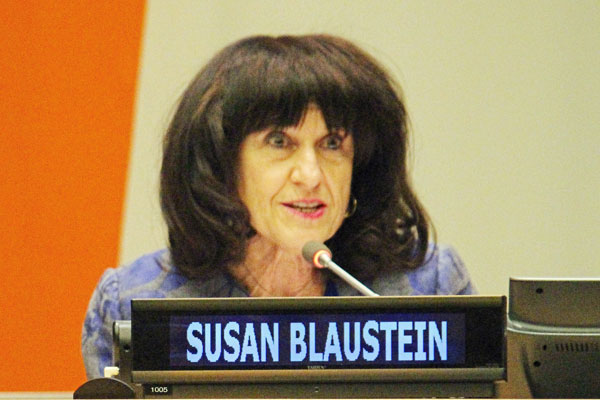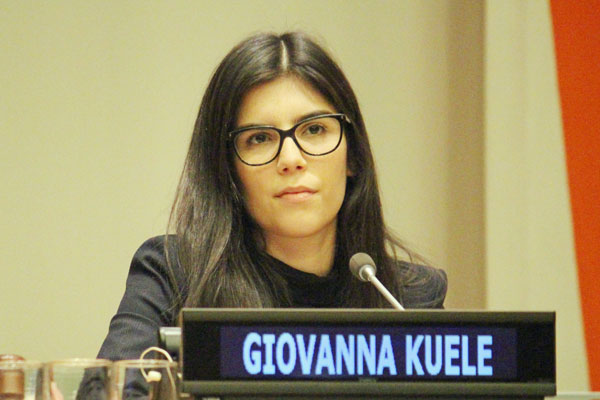Climate Change - A Threat to Global Stability
- Irwin Arieff, Journalist, PassBlue
- Giovanna Kuele, Research Fellow, Igarape Institute, Brazil
- Susan Blaustein, Founder, WomenStrong International, and Co-Founder and Director, Millennium Cities Initiative (MCI), Earth Institute, Columbia University
- Franz Baumann, visiting Professor at NYU; former Assistant Secretary-General and United Nations Special Adviser on Environment and Peace Operations.
Irwin Arieff –a veteran journalist, with extensive experience covering the United Nations, international diplomacy and US politics, in New York, Washington and Paris, and also a member of CTAUN’S Advisory Council –served as moderator.
Mr. Arieff spoke about the Consensus project – a work of 21 years, and 4000 research papers in which 97.1% of scientists involved endorsed the consensus that climate change is real. “The science is clear – what is not is the politics,” he said.

Susan Blaustein – Founder & Executive Director, WomenStrong International
Dr. Blaustein’s topic was How Climate Change Disproportionately Burdens Women and Girls and What We as Teachers Can Do About It. She started by giving us the current geographic scope of WomenStrong’s work – Ghana, Kenya, India and Haiti, and painted a vivid picture of how the downward spiral affects each region:

Kumasi, the capital of Ghana’s Ashanti region –
Less productive land is less valuable land, inducing landowners to sell to hungry real estate developers, who not only deforested more of the land in order to build, they literally sold out the farmers’ livelihood, disrupting traditional family life. The men were forced to take jobs as day laborers, or traders, sometimes venturing far away for months at a time. Women, in addition to being left to provide for their children, now had to buy produce they used to grow themselves, and then spend an arduous day trying to sell it in the marketplace to make ends meet, leaving children to fend for themselves.
Many children drop out of school. There is significant use of alcohol and drugs among boys, and some girls leave for town to live with older men who pay their school fees in exchange for sexual favors. They return home pregnant, ashamed, out of school and alienated from their friends and their dreams. In some cases, where men cannot find work at all, frustration and depression set in, fueling alcoholism and domestic violence. What starts with climate change tragically ends in community collapse.
Kisumu – in Western Kenya –
Drought parches ancestral villages, driving women to the slums of Manyatta. There is dramatically reduced rainfall due to climate change, compounded by decimated crop yield from over-farming. Kisumu is on the shores of Lake Victoria –Africa’s largest – fed by 5 rivers where water levels are at record lows, and the fish catch, according to the Global Nature Fund: E. Africa Living Lakes Network, has been reduced by 30-40 %. This affects the local fishermen, as well as the well-being, purchase power, diet and mores of the local population – “Sex for fish” is common as barter.
Southern India –
In the slums of Madurai, last August (2018) saw the worst monsoon flooding in Kerala State in 100 years. Many of the women in the WomenStrong program went to Kerala to help care for the displaced. Three months later, their own Tamil Nadu State was hit with Cyclone Gaja – its 180km/hour winds destroyed nearly 60,000 hectares of crops and trees, disrupting their food supply, driving up prices and demolishing their flimsy housing.
Haiti-
Currently the third most vulnerable country, in September and October 2018 the effects of Hurricanes Irma and Matthew coming within weeks of one another left ripped out banana fields, 800,000 needing food, $2.8 billion in infrastructure and crop damage and wiped out the only road in their mountainous commune. It also ravaged WomenStrong’s experimental tilapia nurseries in the northern part of the country. But the region was in crisis long before Matthew, causing fathers and youth to leave in droves for the capital or the Dominican Republic, placing crushing pressure on families and whole communities.
In New York, the properties most vulnerable to sea rise from Hurricane Sandy were not only low-lying, but harboring the lowest income populations as well. Power outages in public housing left residents without lights, elevators, refrigerators for their food and medicine, and access to public information, putting the elderly and disabled at risk.
The good news, which Dr. Blaustein calls both awesome and profoundly shaming, is that pro-active young people are leading the way to their future. She is the second of our speakers to point to 16 year-old Swedish activist, Greta Thunberg, organizer of the brilliant global school strikes for climate, who addressed both the UN climate conference in December and the rich and powerful at Davos in January. Her video Our House is on Fire, which can be seen on You Tube, is listed in our resources. In another case, 21 American students, ranging in ages from 23 -11, with the assistance of an NGO called Our Children’s Trust, have filed a lawsuit against the government for ‘violation of our constitutional rights and failing to protect essential public trust resources.’ Despite attempts by the current administration to kill it, the lawsuit is moving through the courts.
What can we as teachers do to give them hope and the tools they need to change politics and protect the planet? She suggested that activities like testing their water or nearby waterways with simple, available devices, and enumerating birds, frogs and other wildlife in their area are empowering additions to any science curriculum.
Giovanna Kuele is a doctoral candidate at the City University of NY Graduate Center, and a Research fellow, Igarape Institute, Rio de Janeiro, Brazil where she analyzed the role of women in the Colombian peace process, and studied innovations to prevent conflict in selected African countries;

“Climate change is a multiplier of insecurity and conflict, crime and corruption. How do we engage countries whose leadership denies the existence of climate change, as well as those who recognize it?” She offered a list of suggestions:
- Engage with local and state governments (eg. states like California and New York) when the federal government fails to act
- Involve Civil Society
- Attract the private sector – make them aware of the economic costs of failing to act
- Talk with the military
- Win over youth – and let them win over their leaders
- Deploy soft diplomacy
- Avoid presenting climate and security as purely negative topics
- Show, don’t tell –present evidence/research–based work
- Promote a balanced approach to the debate
- Focus on specific stressors
Dr. Franz Baumann – Visiting Research Professor, NYU, focusing on international governance of climate change, the 2030 Agenda for Sustainable Development, UN Management Reform and the political economy of Africa; Former UN Assistant Secretary-General, and Special Advisor on Environment and Peace Operations

Dr. Baumann began by asserting that “It will not be our generation, but the young, who will change the world – and it needs changing. We are on a collision course with Nature. The climate has changed over time, but never as fast as in the last few years.”
“Global heating is the flip side of a success story,” he said. “As our wealth has increased, so has our population.” He used graphs for comparisons to illustrate the speed of change, and the growth of humanity on the planet. It took from year 0 till the time of Napoleon for the species to reach 1 billion, and not until the end of WWII to climb to the 2 billion mark. Yet we needed only 12 years to get to 6 billion, and only 8 more years to reach the 7th billion. Many children in the 19th Century died before their 5th birthday, and available resources were wind, water and wood, plus human ingenuity. In 200 years we changed the earth by our vertiginous use of fossil fuels, and due to improvements in health, human life expectancy has grown. In the 1950’s economy, the average annual salary was $500, and in 1970 there were 250 million vehicles on the road. Today there are 105 billion, predicted to double in 30 years. Humanity and emissions are not homogeneous: the GDP per capita of the US averages $60,000; in Ghana eg. it is $1100.
Solar panels and windmills will not solve the problem. CO2 stays in the atmosphere for centuries, and 58% of it was created in Europe and N. America. Global inequality gives 46% of the resources to 10% of the wealthiest. One US citizen uses double the electricity of someone in India, and six times as much as a person in Ghana. Energy use is greater now than in all former years combined. The affluent don’t want to give up their luxuries – including what are seen as necessities, such as planes and cars. Is it even possible in a capitalistic system? The deadline date was not set by politicians, but by Nature, and Nature doesn’t negotiate. The clock is ticking, and the tipping point will be reached in our generation and will be unbearable for our children and grandchildren.
This is the greatest public policy problem the world has ever faced. Change can only happen with cooperation and compromise – not attitudes like “America First” etc. When asked if overcoming the crisis is possible, he was pessimistic. “I fear we will not make it, “ he said.
In a Q&A to the panel about the industrialization of animal agriculture, he agreed that when it comes to food, the meat industry, especially beef production, has the highest carbon footprint. The global food system represents 30% of the world’s carbon footprint half of which comes from meat production and animal agriculture, surpassing the entire transport sector. In addition, overconsumption of meat is a public health risk, and the World Health Organization (WHO) has classified processed meat as a Group 1 carcinogen, alongside tobacco and alcohol. “Change what you choose to buy and eat.”
Dr. Baumann has offered to answer questions, and can be reached at franz.baumann@nyu.edu
